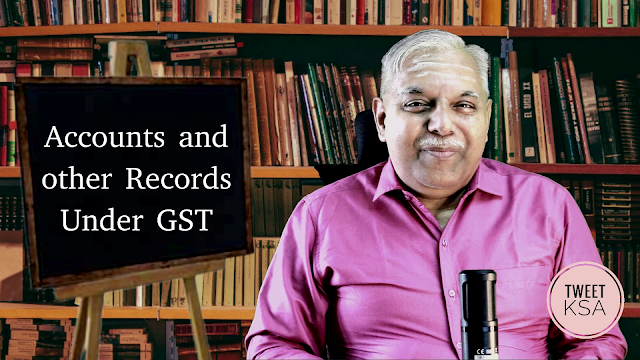Accounts and other
Records Under GST
Section 35 of Central Goods and Services Tax Act 2017 - Accounts and Other Records
(1) Every registered person shall keep and maintain, at
his principal place of business, as mentioned in the certificate of
registration, a true and correct account of-
·
production or manufacture of goods.
·
inward and outward supply of goods or services or both.
·
stock of goods.
·
input tax credit availed.
·
output tax payable and paid; and
· such other particulars as may be prescribed:
Provided that where more than one place of business
is specified in the certificate of registration, the accounts relating to each
place of business shall be kept at such places of business:
Provided further that the registered person may keep
and maintain such accounts and other particulars in electronic form
in such manner as may be prescribed.
(2) Every owner or operator of warehouse or godown
or any other place used for storage of goods and every transporter,
irrespective of whether he is a registered person or not, shall
maintain records of the consigner, consignee and other relevant details of
the goods in such manner as may be prescribed.
(3) The Commissioner may notify a class of taxable
persons to maintain additional accounts or documents for such purpose as may be
specified therein.
(4) Where the Commissioner considers that any
class of taxable person is not in a position to keep and maintain accounts
in accordance with the provisions of this section, he may, for reasons to be recorded
in writing, permit such class of taxable persons to maintain accounts in such
manner as may be prescribed.
(5) Every registered person whose turnover during a financial
year exceeds the prescribed limit shall get his accounts audited by a chartered
accountant or a cost accountant and shall submit a copy of the audited
annual accounts, the reconciliation statement under sub-section (2) of
section 44 and such other documents in such form and manner as may be
prescribed.
(6) Subject to the provisions of clause (h) of
sub-section (5) of section 17, where the registered person fails to
account for the goods or services or both in accordance with the provisions
of sub-section (1), the proper officer shall determine the amount of tax
payable on the goods or services or both that are not accounted for, as if
such goods or services or both had been supplied by such person and the provisions
of section 73 or section 74, as the case may be, shall, mutatis mutandis,
apply for determination of such tax.
Section 36 – Retention of
accounts – 72 months from furnishing annual return.
Rule 56
Maintenance of accounts
by registered persons.
(1) Every registered
person shall keep and maintain, in addition to the particulars mentioned in
sub-section (1) of section 35, a true and correct account of the goods
or services imported or exported or of supplies attracting payment of tax on
reverse charge along with the relevant documents, including invoices, bills of
supply, delivery challans, credit notes, debit notes, receipt vouchers, payment
vouchers and refund vouchers.
(2) Every registered
person, other than a person paying tax under section 10, shall maintain the
accounts of stock in respect of goods received and supplied by him, and
such accounts shall contain particulars of the opening balance, receipt,
supply, goods lost, stolen, destroyed, written off or disposed of by way of
gift or free sample and the balance of stock including raw materials, finished
goods, scrap and wastage thereof.
(3) Every registered
person shall keep and maintain a separate account of advances received, paid
and adjustments made thereto.
(4) Every registered
person, other than a person paying tax under section 10, shall keep and
maintain an account, containing the details of tax payable (including tax
payable in accordance with the provisions of sub-section (3) and sub-section
(4) of section 9), tax collected and paid, input tax, input tax credit claimed,
together with a register of tax invoice, credit notes, debit notes, delivery
challan issued or received during any tax period.
(5) Every registered
person shall keep the particulars of –
(a) names and complete
addresses of suppliers from whom he has received the goods or services chargeable
to tax under the Act;
(b) names and complete
addresses of the persons to whom he has supplied goods or services, where required
under the provisions of this Chapter;
(c) the complete
address of the premises where goods are stored by him, including goods
stored during transit along with the particulars of the stock stored therein.
(6) If any taxable
goods are found to be stored at any place(s) other than those declared under
sub-rule (5) without the cover of any valid documents, the proper officer
shall determine the amount of tax payable on such goods as if such goods have
been supplied by the registered person.





